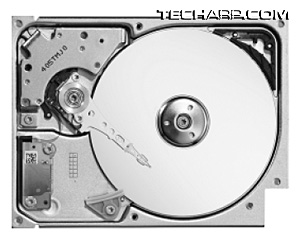Recording Media
Usually, the first thing that a salesman will ask you is if you are looking for a camcorder that records to a hard drive, DVD or MiniDV tapes. The three main types of recording media not only determine the ease of use and recording time, it also affects the features your camcorder comes with.
Hard Drive
 |
||
Capacity |
Recording Time |
|
SD @ 9 Mbits/s |
HD @ 15 Mbits/s |
|
30 GB |
7 hours 24 mins |
4 hours 26 mins |
40 GB |
9 hours 52 mins |
5 hours 55 mins |
60 GB |
14 hours 48 mins |
8 hours 53 mins |
100 GB |
24 hours 41 mins |
14 hours 48 mins |
HDD-based camcorders are the latest rage. They make use of integrated hard drives, usually of the 1.8" form-factor. These hard drives have large capacity, usually ranging from 30GB to 60GB although Sony will be launching a HDD-based camcorder with a 100GB capacity. This gives them a tremendous amount of recording time, which ranges from 4 hours to over 11 hours, depending on the video quality and compression. Of course, this also depends on battery life.
However, hard drives are susceptible to damage from shocks and vibration. While manufacturers have taken steps to ensure the hard drive will survive even an accidental drop, the hard drive is definitely less robust than the other two media options. In addition, most HDD-based camcorders do not allow the removal of the hard drive which renders the camcorder useless if the hard drive fails for any reason.
Finally, while they have a large capacity, that capacity is fixed. If you run out of space in the hard drive, you must transfer out or delete some of your recorded video clips before you can record more. This may be inconvenient if you do not have a way to transfer out the files (e.g. when you are travelling without a notebook).
HDD camcorders are best for those who want the convenience of a long recording time. Without the need to pack DVDs or MiniDV tapes for the trip, all you need are the camcorder and spare batteries.
Flash Memory
Recording Mode |
Capacity |
|
4 GB |
8 GB |
|
HD @ 13 Mbits/s |
41 mins |
1 hour 22 mins |
HD @ 9 Mbits/s |
59 mins |
1 hour 58 mins |
HD @ 6 Mbits/s |
1 hour 28 mins |
2 hours 57 mins |
Currently, the only camcorder to make use of flash memory is the Panasonic HDC-SD1, although there will also be a new updated model soon - the Panasonic HDC-SD3. Both camcorders make use of SDHC (Secure Digital High Capacity) flash memory cards as recording media, instead of a hard drive or DVD or MiniDV tape.
Flash memory cards are very small, extremely robust and very power-efficient. As a result, flash-based camcorders are very small and light. You also need not worry about losing your recorded video should you drop the camcorder. At the very least, the flash memory card will survive the impact. The low power consumption also help improve battery life.
However, flash memory cards have a relatively small storage capacity. Currently, the highest available capacity is 8GB. Although that is 3X the capacity of a dual-layer DVD, it's still far less storage space than what HDD camcorders can provide.
This not only limits its continuous recording time, it also indirectly reduced its video quality. To achieve a reasonably good recording time, the Panasonic HDC-SD1 uses a slightly lower bit rate of 13 Mbits/s. This results in a slightly poorer quality video due to the higher compression. It also doesn't help that flash memory cards are a lot more expensive than the other recording media.
There is good news though. Higher-capacity 16GB cards are on the way and you can buy multiple cards and swap as they run out of space. Also, while they cost more per GB than other media, they are rated for at least 10,000 rewrites - many times more than MiniDV tapes or rewritable DVDs. They are therefore more cost-effective in the long run.
Flash-based camcorders are best for those who want a compact, light camcorder using a small, robust media.
<<< High Definition Recording, 720p Or 1080i?, Do You Have Full HD? : Previous Page | Next Page : Recording Media - DVD, MiniDV >>>







 Add to Reddit
Add to Reddit
